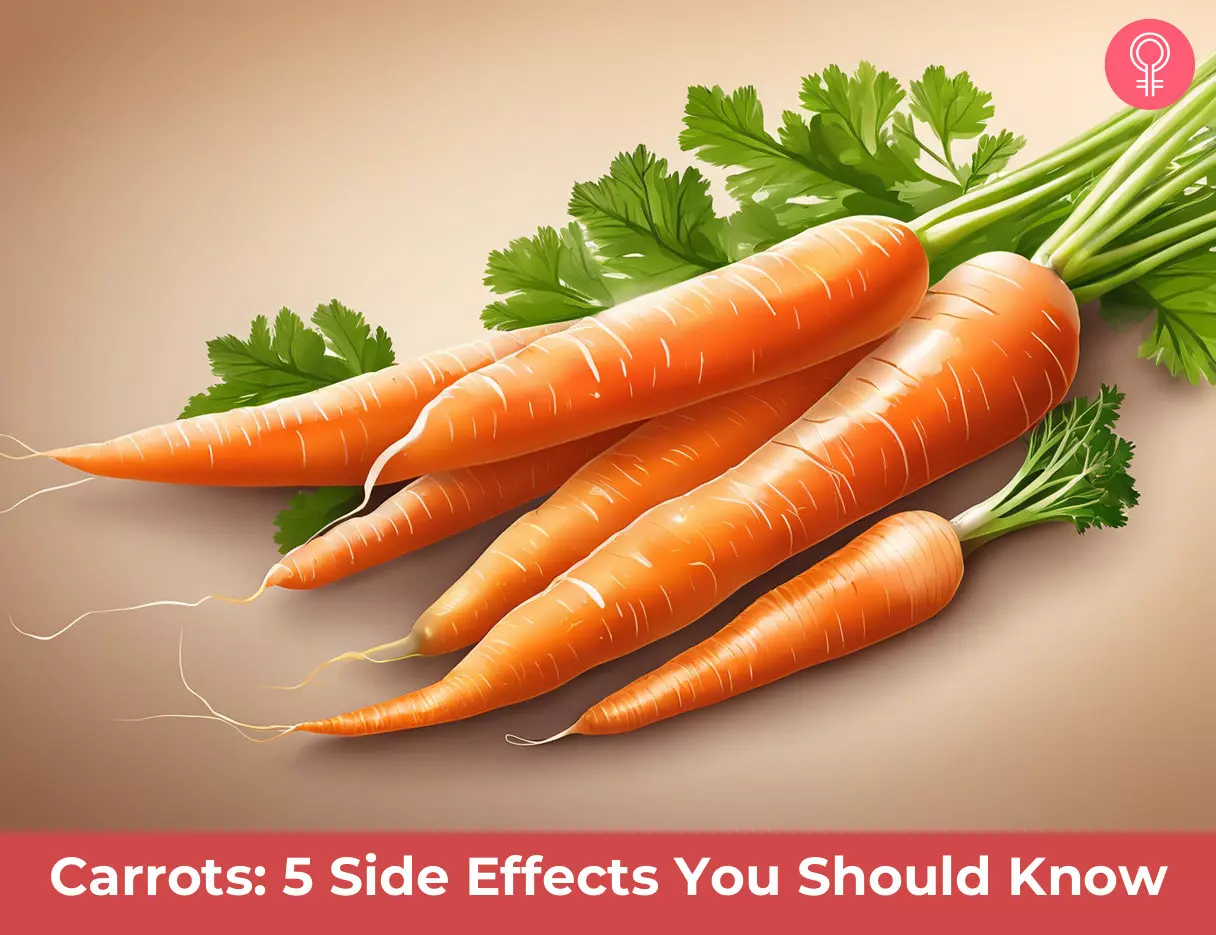Carrots: 5 Side Effects You Should Know
Learn how this nutritious veggie can harm your health before you reach for that next bite.

Image: Shutterstock
Several side effects of carrots may make you think twice before consuming them. This crunchy veggie has a rich nutritional profile. It is a good source of beta-carotene, an important provitamin. In the body, beta-carotene is converted into vitamin A.
Nevertheless, carrots can have unpleasant effects if consumed in excess. They can be severe in some cases. This article examines the side effects of carrots, their safety, and their recommended intake. Read on.
 Know The Flip Side: Carrot
Know The Flip Side: CarrotShort-Term Effects
May cause allergic reactions such as lip-swelling and even cause flatulence or gas.
Long-Term Effects
May cause vitamin A toxicity and skin discoloration.
Drug Interactions
May interact with diabetic medication.
When To See A Doctor
If you experience any symptoms such as itching or irritation in the eyes or nose, seek medical help immediately.
In This Article
What Are The Side Effects Of Carrots?
You may have heard of the many benefits of carrots, however, excessive intake can lead to several health issues. Learn about the common side effects of carrots below!
1. May Cause Vitamin A Toxicity

In a case report, an individual who consumed excess of carrots was hospitalized on the grounds of abdominal pain. His liver enzymes were found to have elevated to abnormally high levels (1). The patient was diagnosed with a mild case of vitamin A toxicity. Levels of vitamin A up to 10,000 IU have been considered safe. Anything beyond that could be toxic (2). Half a cup of carrot has 459 mcg of beta-carotene, which is about 1,500 IU of vitamin A.
Vitamin A toxicity is also called hypervitaminosis A. Symptoms can include loss of appetite, nausea, vomiting, diarrhea, loss of hair, fatigue, and nose bleeding (3).
Toxicity occurs because vitamin A is fat-soluble. Any excess vitamin A not required by the body will be stored in the liver or fat tissue. This can lead to the accumulation of vitamin A over time and eventual toxicity (4).
Chronic vitamin A toxicity can affect multiple organ systems. It can inhibit bone formation, leading to weaker bones and fractures. Long-term vitamin A toxicity may also affect kidney function (5).
 Trivia
Trivia2. Can Cause Allergies

Though carrot alone is rarely responsible for allergies, it may cause reactions when consumed as part of other foods. In a report, the ingestion of carrot contained in an ice cream caused allergic reactions (6).
Carrot allergies may affect over 25% of individuals with food allergies. This could be associated with their allergy to specific carrot proteins (7). Individuals with pollen food syndrome are the most likely to be allergic to carrots (8).
Symptoms of carrot allergy include itching, hives, skin rash or swelling of the lips and irritation of the eyes and nose (9). In rare situations, carrot intake may also lead to anaphylaxis (6). If you have any food allergies, it is best to talk to a doctor before eating carrots or anything made with carrots. This can help you avoid allergic reactions to carrots.
Patti Murin, a blogger, shared her bad experience with carrots and how it caused an allergic reaction in her personal blog. She writes, “When I ate a carrot, my lips would get itchy (i).” She also shares how the itching would naturally lead to facial swelling and redness as well, as the allergic reaction increased. She mentions an incident where she drank carrot juice and had to be rushed to the ER, writing, “The ambulance took about 10 minutes to arrive and in that time, my tongue swelled up to the size of my mouth, my breathing canal was getting thinner, and I could no longer speak.”
3. May Cause Flatulence

Certain individuals may find carrots difficult to digest, which may cause indigestion or stomach cramps. This can get aggravated if you have too many of them, eventually leading to flatulence (or stomach gas) (10).
4. Might Be Unsafe For Infants
This has more to do with the size of the carrots. Carrot sticks carry the risk of choking infants (11). Hence, you may want to limit the amount of carrots you are giving to your infants. More importantly, make them into a paste.
5. Can Cause Skin Discoloration

Eating too many carrots can cause a harmless condition called carotenemia. This is caused by too much beta-carotene in your bloodstream, which causes either orange coloring of skin or urine, or both (12).
Carotenemia is highly unlikely unless you are on a restricted diet in which you are required to eat too many carrots for a long time. One medium carrot contains about 4 milligrams of beta-carotene. Consuming more than 30 milligrams of beta-carotene every day for a few weeks can cause skin discoloration (12).
 Fun Fact
Fun FactThese are the side effects of carrots you need to be wary about. But as discussed, eating too many of them in a day is a problem. Otherwise, they are among the healthiest foods you can snack on.
Key Takeaways
- Excess consumption of carrots can cause one to develop turn orange skin or carotenemia.
- Overconsumption of carrot juices can lead to gas and bloating.
- Carrots can cause vitamin A toxicity, which results in dry skin, hair loss, and joint pain.
- Carrots might cause itching, swollen lips, or irritation of the eyes and nose in some individuals.
How Many Carrots Can You Eat In A Day?

One medium carrot contains about 509 micrograms (RAE, or retinol activity equivalent) of vitamin A (13).
The tolerable upper level of vitamin A to prevent toxicity is 3,000 micrograms RAE per day (14).
This equates to about five to six carrots. Do not to go beyond this. Sticking to three to four carrots a day should be the safe option. Remember, how you cook them also matters. Raw, steamed, or roasted carrots are the best ways to get the most nutrients without any of the potential side effects.
 Trivia
TriviaTo make the most of carrots without overdoing them, consider these practical tips for maximizing their nutritional value while minimizing side effects.
Tips For Maximizing Benefits And Minimizing Risks Of Carrots
- Avoid eating too many carrots to prevent carotenemia, a harmless condition that can color skin yellow-orange.
- Since carrots naturally contain sugar, eating healthy fats or proteins can help keep blood sugar levels stable.
- Though rare, some individuals may experience itching, swelling, or breathing difficulties after consuming carrots and should seek medical advice.
- To ensure that carrots do not interfere with their diabetes medicine or blood thinners, anyone taking these medications should speak with their doctor first
Consume carrots in various forms — raw, cooked, or juiced carrots — for balanced nutrition.
Infographic: Serious Side Effects of Eating Carrot
Carrot is a delicious vegetable that provides a host of health benefits. However, many people do not know that overconsumption can cause severe side effects. Check out the infographic below to understand the serious side effects of eating too many carrots. Illustration: StyleCraze Design Team
Carrots are highly nutritious root vegetables with many medicinal properties. If taken regularly, their rich antioxidant profile can benefit you in many ways. However, excess consumption of carrots (having more than four per day) may lead to several side effects. This is equally true for carrot juice too. There are many carrot juice benefits such as promoting weight loss, enhancing vision, and improving digestive health. However, a cup (236 grams) of carrot juice contains over 45,000 IU of vitamin A. So, overconsumption of the juice may cause vitamin A toxicity, allergies, flatulence, and skin discoloration. It is also unsafe for infants. Hence, consume carrots in the recommended amounts to avoid any adverse reactions. Consult your health care provider in case of any medical emergencies.
Frequently Asked Questions
Are raw carrots safe to eat?
Yes. According to Julianna Coughlin, MS, RD, LDN, “Carrots are a great source of vitamin C and vitamin A and can definitely help with so many things. It’s advised to not eat carrots if you have an allergy or an intolerance, but other than that, they are largely excepted as safe. They can positively impact the gut microbiome because of the fiber they provide.” However, the intake of too many raw carrots may cause intestinal issues and also interfere with nutrient absorption.
Do carrots make you gain weight?
No. Carrots consumption is linked with weight loss due to their high water and fiber content (16), (17).
Are carrots good before bed?
Carrots are not good before bed due to the presence of carotenoids, which are positively associated with shorter sleep duration (18).
Illustration: Carrots: 5 Side Effects You Should Know

Image: Stable Diffusion/StyleCraze Design Team
While carrots are beneficial, it’s important to be aware of potential side effects. Explore 5 crucial considerations in this insightful video. Stay informed!
Personal Experience: Source
StyleCraze's articles are interwoven with authentic personal narratives that provide depth and resonance to our content. Below are the sources of the personal accounts referenced in this article.
i. Last Week, Carrots Tried to Kill Me.https://pattimurin.blog/2015/11/07/last-week-carrots-tried-to-kill-me/
References
Articles on StyleCraze are backed by verified information from peer-reviewed and academic research papers, reputed organizations, research institutions, and medical associations to ensure accuracy and relevance. Read our editorial policy to learn more.
- Carrot man: a case of excessive beta-carotene ingestion, The International Journal of Eating Disorders, US National Library of Medicine, National Institutes of Health.
https://pubmed.ncbi.nlm.nih.gov/22431270/ - The safety of commonly used vitamins and minerals, US National Library of Medicine, National Institutes of Health.
https://pmc.ncbi.nlm.nih.gov/articles/PMC8377299/ - Vitamin A and carotenoid toxicity, SAGE Journals.
https://journals.sagepub.com/doi/pdf/10.1177/156482650102200309 - Vitamin A Toxicity, US National Library of Medicine, National Institutes of Health.
https://www.ncbi.nlm.nih.gov/books/NBK532916/ - Vitamin A Toxicity, National Center for Biotechnology Information.
https://www.ncbi.nlm.nih.gov/books/NBK532916/ - Anaphylaxis due to carrot as hidden food allergen, Allergologia et immunopathologia, US National Library of Medicine, National Institutes of Health.
https://pubmed.ncbi.nlm.nih.gov/12199970/ - Carrot allergy: double-blinded, placebo-controlled food challenge and identification of allergens, The Journal of Allergy and Clinical Immunology, US National Library of Medicine, National Institutes of Health.
https://pubmed.ncbi.nlm.nih.gov/11496252/ - Carrot allergy: double-blinded, placebo-controlled food challenge and identification of allergens, US National Library of Medicine, National Institutes of Health.
https://pubmed.ncbi.nlm.nih.gov/11496252/ - Carrot-Induced Systemic Reaction: A Unique Presentation of Pollen-Food Allergy Syndrome in a Young Boy, US National Library of Medicine, National Institutes of Health.
https://pmc.ncbi.nlm.nih.gov/articles/PMC10670796/ - Tips on Controlling Gas, International Foundation for Gastrointestinal Disorders.
https://iffgd.org/gi-disorders/symptoms-causes/intestinal-gas - Choking Hazards, Centers for Disease Control and Prevention.
https://www.cdc.gov/infant-toddler-nutrition/foods-and-drinks/choking-hazards.html?CDC_AAref_Val=https://www.cdc.gov/nutrition/infantandtoddlernutrition/foods-and-drinks/choking-hazards.html - Carotenemia, US National Library of Medicine, National Institutes of Health.
https://www.ncbi.nlm.nih.gov/books/NBK534878/ - Carrots, raw, United States Department of Agriculture.
https://fdc.nal.usda.gov/fdc-app.html#/food-details/170393/nutrients - Vitamin A, National Institutes of Health, Office of Dietary Supplements.
https://ods.od.nih.gov/factsheets/VitaminA-HealthProfessional/ - Carrot juice, canned, United States Department of Agriculture.
https://fdc.nal.usda.gov/fdc-app.html#/food-details/170491/nutrients - Chemical composition, functional properties and processing of carrot—a review
https://www.ncbi.nlm.nih.gov/pmc/articles/PMC3550877/ - The effects of the fibre content and physical structure of carrots on satiety and subsequent intakes when eaten as part of a mixed meal
https://pubmed.ncbi.nlm.nih.gov/16925866/ - Serum Nutritional Biomarkers and Their Associations with Sleep among US Adults in Recent National Surveys
https://journals.plos.org/plosone/article?id=10.1371/journal.pone.0103490
Read full bio of Dr. Geeta Dharmatti
- Julianna Coughlin, MS, RD, LDN, has worked as a dietitian in long-term care for five years and strives to provide the best nutrition care to her clients. She attended Framingham State University and majored in Nutrition and Dietetics. She graduated in the spring of 2015 and passed the Registered Dietitians exam. She then earned a master's degree in Dietetics at the University of Nebraska-Lincoln in 2020.
 Julianna Coughlin, MS, RD, LDN, has worked as a dietitian in long-term care for five years and strives to provide the best nutrition care to her clients. She attended Framingham State University and majored in Nutrition and Dietetics. She graduated in the spring of 2015 and passed the Registered Dietitians exam. She then earned a master's degree in Dietetics at the University of Nebraska-Lincoln in 2020.
Julianna Coughlin, MS, RD, LDN, has worked as a dietitian in long-term care for five years and strives to provide the best nutrition care to her clients. She attended Framingham State University and majored in Nutrition and Dietetics. She graduated in the spring of 2015 and passed the Registered Dietitians exam. She then earned a master's degree in Dietetics at the University of Nebraska-Lincoln in 2020.
Read full bio of Ravi Teja Tadimalla
Read full bio of Arshiya Syeda
Read full bio of Aparna Mallampalli


























Community Experiences
Join the conversation and become a part of our empowering community! Share your stories, experiences, and insights to connect with other beauty, lifestyle, and health enthusiasts.